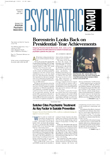The U.S. Supreme Court ruled in May that the production and distribution of marijuana for medicinal purposes is illegal. The 8-0 ruling said that, according to current federal law, no exceptions exist, even for compassionate measures such as for patients fighting cancer or AIDS or for such psychiatric disorders as depression or bipolar disorder.
The unanimous ruling, although not unexpected, served to fuel the long-standing debate over whether marijuana should be available for medical use when other therapeutic interventions have failed. Nine states have some type of statute allowing the distribution of marijuana for medical use.
Active Compounds
One of the plant’s active compounds, tetrahydrocannabinol (THC), has been available as an FDA-approved, Schedule III controlled substance for more than 15 years as the drug dronabinol (Marinol). Drugs categorized as Schedule III substances by the Drug Enforcement Administration (DEA) have a moderate potential for abuse and dependence and may be prescribed by a DEA-registered physician with some restrictions, including the limitation of not being able to refill the prescription more than five times or for longer than six months after the original prescription is written.
Marijuana as a whole plant, with more than 400 of its active compounds isolated so far, is a Schedule I controlled substance. Schedule I drugs have very high potential for abuse and dependence and have no accepted medical use.
Proponents of the drug’s use have claimed for years that it is very effective in patients battling both cancer and AIDS to help alleviate otherwise uncontrollable nausea. Also, many anecdotal reports have praised marijuana’s ability to control treatment-refractory depression and stabilize patients with bipolar disorder.
APA Policy Guideline
APA’s policy guideline on the use of marijuana for medical purposes calls for more research that compares the effects of the smoked plant with those of aerosol delivery and oral preparations of some of its active compounds.
The policy guideline, issued in 1997, calls for further research on the various compounds found in the whole plant and reinforces that the FDA’s provisions for drug approval and “compassionate use” regulations should be followed, giving consideration to “compassion for the ill, along with research support for safety and efficacy.” The policy guideline indicates that, if approved, whole marijuana should be a Schedule II controlled substance.
The Supreme Court’s ruling did not address the validity of marijuana’s use for medical purposes; it addressed only the legal aspects of making it available.
The case, U.S. v. Oakland Cannabis Buyers’ Cooperative, No. 00-151, involved one of California’s local marijuana-distribution clinics, which was raided by federal officials and closed, even though both state and local laws allowed the distribution of marijuana for documented medical purposes when prescribed by a physician.
However, the Supreme Court’s decision, written by Justice Clarence Thomas, upheld federal authorities’ ability to obtain a court order shutting down the clinic. The opinion noted that marijuana is classified under the federal Controlled Substances Act as a Schedule I drug and therefore its distribution was illegal.
The Court’s ruling said that under current federal drug-control laws, including the Controlled Substances Act, Congress included no mechanism to allow an exception for “medical necessity.” The only way to allow such an exception, the Court noted, is for Congress to change current law.
The case against the cooperative was brought by the U.S. Department of Justice under the Clinton administration. It argued that allowing the Oakland clinic to continue to distribute marijuana to those who could prove medical necessity amounted to the creation of a massive loophole in federal drug-control laws.
While on the campaign trail last year, President George W. Bush noted that the issue was a difficult one. He said he supported a state’s right to devise its own marijuana policies that may be at variance to the federal approach, but noted that on a personal level, he was opposed to medical marijuana laws.
When the case was argued before the Supreme Court in March, Bush issued a statement saying that he supported the Justice Department’s position in the case.
More information on U.S. v. Oakland Cannabis Buyers’ Cooperative, No. 00-151, may be found on the Web at www.supremecourtus.gov by searching for case number 00-151. ▪
